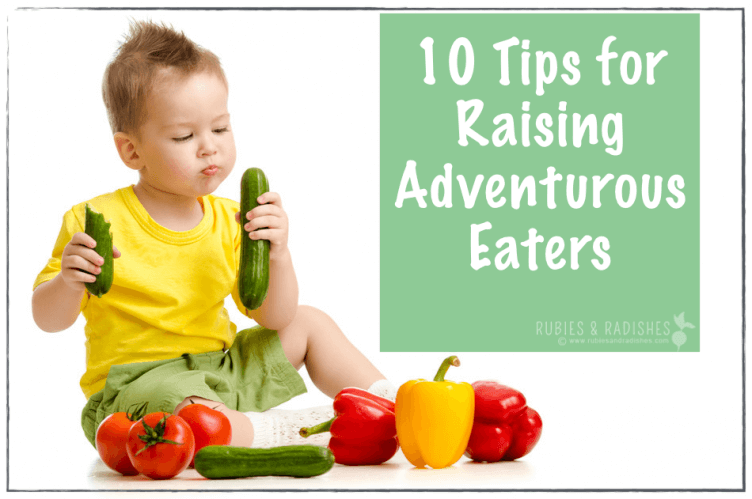In my post about first foods that will nourish your baby, I mentioned that the approach we take is two-fold. First, we emphasize nutrient dense foods in our baby’s diet and second, we want to create an environment where she learns to relax and enjoy her meal.
Although, I personally love to cook and eat, I tend to plow through my meals. It takes lots of concentration for me to slow down and eat mindfully. I am working on it! But, I hope to teach my daughter to have healthy eating habits from the start.
We have been implementing the below tips since our daughter started eating solids and I am happy to report that she is a fantastic eater. She takes her time eating her meals, she eats just about everything and she is a joy to dine out with.
Here are some to tips to help you raise a babe that is as adventurous of an eater as Anthony Bourdain and as mindful as the Dalai Lama. 🙂
10 Tips for Raising Adventurous and Mindful Eaters
1. Wait until your baby is ready for solids.
Observe your baby, when they are ready for solids they will act interested in food. All babies are different and will be ready at different times. Introducing solids at six months is a good rule of thumb, but some babies are ready a bit later. Trust your baby’s signals.
2. Introduce 1 food at a time and only introduce a new food every few days.
Babies have immature digestive systems, so they can even have adverse reactions to healthy foods. If you only introduce a new food every few days, you will be able to identify which food they are having a reaction to.
Also, eating solid foods is such a new and exotic experience, eating one food at a time will allow the baby to differentiate tastes and textures.
3. Offer the same food many times.
It can take a baby 10-15 tries before they enjoy a food. Children often need repeated exposure to even taste a food, let alone eat it. Indy eats almost everything, but most foods have taken her 2-3 tries, before she enjoys them. Sauerkraut and olives are two of her favorite foods now, but she tried each of them close to 10 times, before she would take more than one bite.
4. Trust and nurture your child’s ability to self-regulate.
Never force food. Remove the words, “one more bite” from your vocabulary. If a baby doesn’t seem ready for solids or a new food they will turn their head away or refuse to open their mouth. Do not pressure them to try it, just nonchalantly remove the food. Children’s appetite will vary depending on what they have already eaten that day or how active they have been. Trust that they know when they have had enough.
We never pressure our toddler to take one more bite. We don’t want her to think that she should be eating after she is feeling full. Sometimes we might ask, do you want one more bite? If she says no, that’s fine, we clear her plate.
5. When spoon feeding, be patient and let the baby eat slowly.
Babies usually take longer to eat than adults. So, if you are spoon feeding, take your time and be mindful of the baby’s pace.
6. Don’t offer praise for eating.
This is harder than it sounds. Being a new parent, we are so fascinated and impressed with our little ones, we constantly want to tell them that they did a good job. However, we don’t want a child to learn to eat to receive an adult’s approval or praise, we want them to learn to eat because they are hungry.
7. Minimize snacking
Often when kids snack too much throughout the day, they aren’t really hungry at meal times. If you find that your child has trouble sitting down for a full meal, take a closer look at how often they eat throughout the day, maybe even keep a food log.
My 2 year old eats 3 solid meals a day and sometimes a small snack of some fruit after her nap. I find that when we have friends or family visiting and she munches all day, she barely eats at meal times.
8. Minimize distractions and focus on eating.
We too often, eat on-the-go or while working on the computer, etc. Treat meal times as a special time with your little one. Limit background noise and other distractions (i.e. cell phones, etc.). Make feeding times a relaxing, intimate and stress-free experience! This will teach children to be present while eating and to enjoy their food. It will also foster a healthy relationship with food as they grow.
9. Keep opinions neutral.
If a child is trying a new food, like liver, that you yourself cannot imagine eating, do not show a negative reaction or make comments like, “I can’t believe he likes that”. Babies and kids take the opinions and reactions of their caregivers very seriously and internalize them quickly, even if they don’t show it. If the baby receives the message that a particular food is “gross”, they will be less likely to eat it. Give them a chance to decide for themselves!
10. Model healthy eating yourself!
Children learn a lot from watching. If they see us enjoying healthy foods and displaying healthy habits, they will be more likely to do the same!
Learn more from some of my favorite parenting books!
- Your Self Confident Baby by Magda Gerber
- Elevating Child Care: A Guide to Respectful Parenting by Janet Lansbury
- Super Nutrition for Babies by Kelly Gelzinger
Click HERE to PIN this post!






One thing I would add. If you’re breastfeeding, eat the food yourself. It will introduce your baby to the flavor of the food. So, for instance, for those who don’t like liver, make yourself eat even just a small amount. Baby will be used to the flavor, and will be willing to try it (and likely like it). This worked amazingly well for my youngest. I didn’t like liver (I’ve learned to like it since), and I took raw liver “pills” regularly, and my son loved it! He also loved all those ferments I was forever eating. 🙂
This is fantastic advice, Christie! Thank you so much for adding!
Great tips, thanks
this is a sample comment